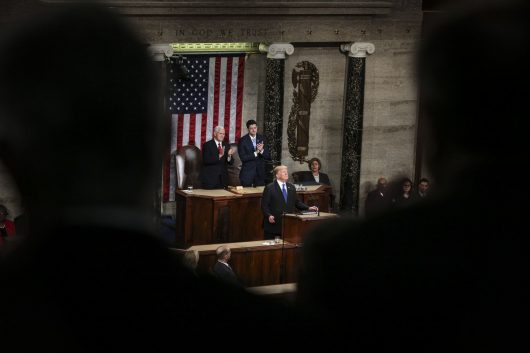
President Donald Trump, center, delivers the State of the Union address to a joint session of Congress in the chamber of the U.S. House of Representatives on January 30, 2018 in Washington, DC. Credit: Courtesy of TNS
President Donald Trump delivered his first State of the Union Address to a joint session of Congress Tuesday night, touching on tax cuts, unemployment, immigration, drugs and foreign policy. He honored veterans and working-class Americans as well as families and police officers. He detailed the past year and shared his vision for the year to come.
He went on to describe the progress in lowering unemployment over the past year, saying that American unemployment was the lowest it has been in 45 years.
Trump also touted the Republican’s recently passed tax reform bill, asserting that the changes provide massive benefits to the middle-class and small businesses.
“This is our new American moment. There has never been a better time to start living the American Dream,” he said.
He then reaffirmed his commitment to a strict interpretation of the Constitution.
“Working with the Senate, we are appointing judges who will interpret the Constitution as written, including a great new Supreme Court justice, and more circuit court judges than any new administration in the history of our country,” Trump said. “We are defending our Second Amendment, and have taken historic actions to protect religious liberty.”
He implored Congress to support rebuilding America’s infrastructure, both in the physical machinations of the country and through labor market work. “We want every American to know the dignity of a hard day’s work. We want every child to be safe in their home at night. And we want every citizen to be proud of this land that we love,” he said.
For many of Trump’s proclamations the crowd was split. For every round of applause half of the room stood clapping enthusiastically while the rest sat motionless, some impassive and others visibly upset.
Though the address is a symbolic gesture to the American people and represents the progress made through the year, it also was an indication of the divisiveness of the current administration.
Ohio State viewers found themselves divided from home, as well.
Nick Frankowski, a third-year in economics and political science, as well as president of the College Republicans, was pleased with Trump’s address. “I was pleasantly surprised,” Frankowski said. “It was a little shallow on a few specific policy reforms, but that’s kind of run-of-the-mill for the State of the Union [Address] these days. I thought it was pretty good.”
Perhaps unsurprisingly, Frankowski’s counterpart in College Democrats, Alexis Oberdorf, disagreed. A second-year in foreign policy and security, Oberdorf called the speech “alarming.”
“There was a fair amount of what I would consider hate speech against communities that at this day are the most vulnerable in this country,” she said. “After the election that put Trump in the position we saw how hate speech can impact the country, which is alarming to me and the college students that he can affect.”

President Donald J. Trump delivers the State of the Union address as Vice President Mike Pence, left, and Speaker of the House Paul Ryan, right, look on in the chamber of the U.S. House of Representatives on January 30, 2018 in Washington, D.C. Credit: Courtesy of TNS
Trump finally delved into foreign policy, including immigration. He once again said open borders allow the influx of drugs and criminals, and that those criminals usurp jobs from poor Americans and pose a danger to American citizens.
To further this point Trump detailed his new immigration plan, with its four pillars being citizenship requirements, closed borders, an abolishment of the visa lottery and an end to chain migration, a term referring to immigrants bringing in family members to the U.S.
“In recent weeks, two terrorist attacks in New York were made possible by the visa lottery and chain migration,” he said. “In the age of terrorism, these programs present risks we can no longer afford.”
Trump also called on Congress to continue to bolster the military, espousing deterrence as the primary motivation to advance the nuclear arsenal. He then announced that he would keep open Guantanamo Bay as a center of military detention.
To wrap up foreign policy Trump denounced the North Korean government and declared that he would drastically change the United States’ approach. “Past experience has taught us that complacency and concessions only invite aggression and provocation,” Trump said. “I will not repeat the mistakes of past administrations that got us into this dangerous position.”


